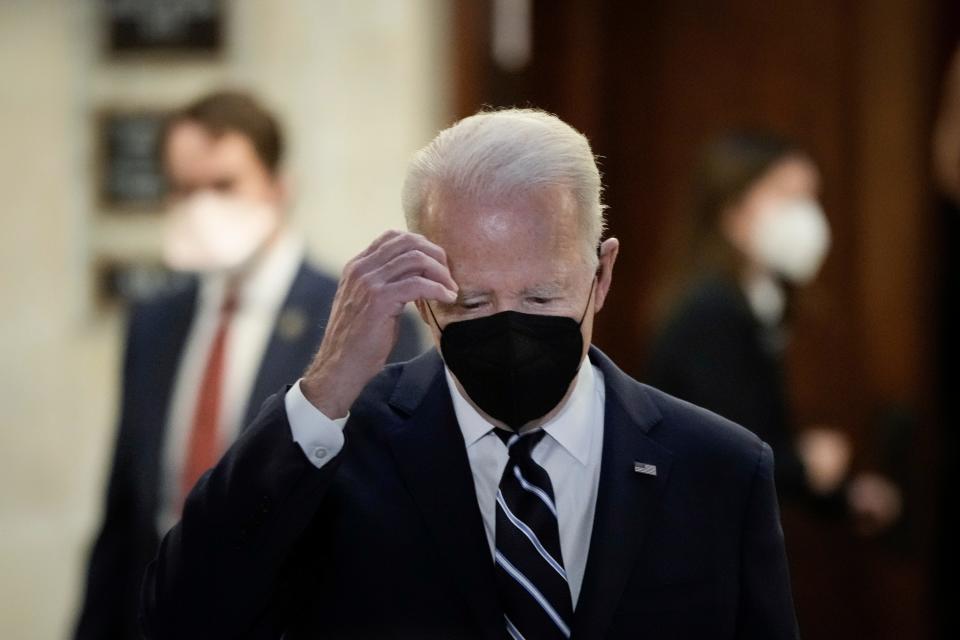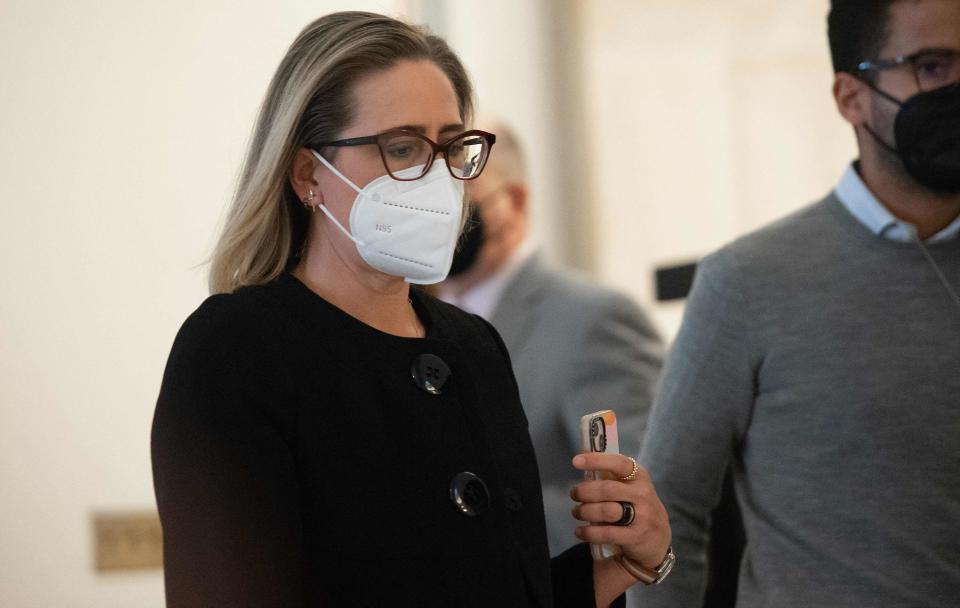As voting rights push fizzles, Biden's failure to unite his own party looms again
- Oops!Something went wrong.Please try again later.
- Oops!Something went wrong.Please try again later.
- Oops!Something went wrong.Please try again later.
WASHINGTON — President Joe Biden started the new year with a feistier, more combative tone toward Republicans, only to be reminded almost immediately that he is still battling with members of his own party.
On Thursday, Sen. Kyrsten Sinema, an Arizona Democrat, dealt a potentially fatal blow to Biden’s renewed push for federal voting rights legislation. In a surprise speech on the Senate floor, she flatly rejected Biden’s plea – issued less than 48 hours earlier – to change the filibuster rules so Democrats could muscle through the voting rights bill without any Republican votes.
Unable yet again to unite his party behind his agenda, Biden's latest setback raised questions over what he can achieve legislatively in Congress this year and whether he wasted political capital, particularly as Democrats face an uphill battle to hold on to power in November's midterm elections.
It marked the second time in less than a month that a lone Democrat – not a unified bloc of Republicans – had spoiled the president's legislative goals. In December, Biden's $1.85 trillion climate and social-spending plan known as Build Back Better also went on life support after Sen. Joe Manchin, D-W.V., said he couldn't support the proposal.
“It’s terribly embarrassing to the prestige of his presidency,” said David Cohen, a political science professor at the University of Akron. He called the timing "pretty devastating" given Biden's reinvigorated push for voting rights just days before. "I’m sure people in the West Wing are very angry at the treatment of this president by members of his own party.”

Adding insult to injury, Sinema's speech came less than an hour before Biden arrived at the Capitol to make his pitch to Senate Democrats in person, delivering a highly public rebuke that made the president’s visit seem like a waste of time.
Manchin followed Sinema's speech with his own statement opposing a filibuster carve-out. It was a swift rejection, coming just two days after Biden publicly endorsed changing the Senate rules for Democrats to pass voting rights legislation in a speech in Atlanta.
The setback also comes a week before Biden is due to mark his first year in office, a moment typically devoted to celebrating the president's successes over the past year. But year one triumphs are likely to be overshadowed by the president's recent shortfalls on his agenda, a Supreme Court ruling undermining his vaccine strategy amid a record surge in nationwide infections and his lowest approval ratings numbers yet.
"He's definitely in a very difficult moment," said Julian Zelizer, professor of history and public affairs at Princeton University. "He's stalled legislatively on a number of key items and there's a lot of pressures." Although he said many presidents have had worse moments and gone on to have two terms, Zelizer added, "I think this is a real test."
High expectations amplify defeats
While Biden was successful in the administration's vaccine roll-out, passed the $1.9 trillion COVID-19 relief package and notched a rare bipartisan win with a $1 trillion infrastructure deal, he might be a victim of his own expectations, according Doug to Sosnik, former White House political director for President Bill Clinton.
"In a political context, a lot of how people measure what you've done is based on the expectations that are set," he said.
Biden's sweeping agenda crashed into the political reality that his party's razor-thin majority came down to an evenly divided Senate and a five-seat margin in the House, which makes it difficult to pass some of the priorities that Democrats had hoped to usher through Congress in the first year.
"I think they get higher marks on what they got done than they did on setting those expectations," Sosnik said.
Biden took a major risk by elevating expectations on the passage of voting rights with his speech Tuesday given the political realities of the filibuster and the long-stated positions of Manchin and Sinema.
The president faced increasing pressure to act from civil rights leaders, who urged Biden months ago to become more forceful on the issue. They've watched in dismay the past year as Republican-controlled state legislatures passed voting restrictions in response to former President Donald Trump's false claims of voter fraud in the 2020 election.
"You cannot create change by reaching across the aisle when the other side says, ‘Hell no,’” veteran Democratic strategist Donna Brazile said. “Then what are you supposed to do? You're supposed to work like hell to try to get those on your side to come across the finish line.”
She said she does not know why Biden could not persuade Manchin or Sinema but credited the president for using his political capital on the issue even as some activists wished he had done so earlier.
"History is not going to record how many speeches Joe Biden gave and how many phone calls he did and how many rallies he held," Brazile said. "I think history will recall that 16 Republican senators turned their backs on the right to vote and Kyrsten Sinema refused to make a carve-out for all citizens to be able to have the freedom to vote."
Brazile was referring to how 16 sitting Republican senators voted for the reauthorization of the Voting Rights Act in 2006 but this year blocked consideration of voting rights legislation.
For Biden, part of expectations is trying to unify the broad coalition of Democrats that stretches from progressives like Rep. Cori Bush, D-Missouri, to more moderates like Manchin, who hails from the coal mining state of West Virginia.
"The task before him was almost impossible, and so I think he needs to be judged on that scale," said Matt Bennett, a longtime Democratic strategist and co-founder of the centrist group Third Way. "I think he's made the most of what he was dealt."
Biden 'not sure' he can get voting rights passed
A new Biden emerged in 2022 more eager to throw more direct barbs at Republicans than in his first 11 months in office. In a remarkably blunt speech commemorating the one-year anniversary of the Jan. 6 Capitol attack, Biden pinned singular responsibility on former President Donald Trump, breaking from his practice of avoiding his predecessor.
The president followed it up with a second speech in Atlanta urging Senate Democrats to support an exemption from the filibuster to pass voting rights bills with a simple majority rather than 60 votes. It was a position he had previously held back from, but he framed the issue in stark new terms, asking whether leaders want to be on side of Bull Connor, George Wallace and Jefferson Davis or King, John Lewis and Abraham Lincoln.
But it did not sway Sinema, who had made clear for months that she opposes changes to the filibuster.

"While I continue to support these bills, I will not support separate actions that worsen the underlying disease of division infecting our country," Sinema said from the Senate floor Thursday.
After his huddle with Senate Democrats at the Capitol, a frustrated Biden gave a bleak outlook on the fate of the two voting rights bills – the Freedom to Vote Act and the John Lewis Voting Rights Act – but vowed not to give up.
"I hope we can get this done, but I'm not sure," Biden told reporters. "But one thing for certain, like other major civil rights movement that came along, if we miss the first time, we come back and try it a second time. We missed this time.
"As long as I have a breath in me, as long as I'm in the White House, as long as I'm engaged in at all," he added, "I'm going to be fighting to change the way these legislatures have moved."
William Howell, a political scientist and professor at the University of Chicago Harris School of Public Policy, called Sinema and Manchin's rebuke of Biden on the filibuster "a car crash happening in slow motion."
"It finally happened today, but you could see it coming for an awful long time," he said. "Institutional reform is really hard, and it takes a whole lot more than one speech to deliver."
Biden met with Manchin and Sinema for about an hour at the White House on Thursday night to continue talks on voting rights, but it was unclear whether any progress was made.
Asked about whether the president has a "Plan B" after Manchin and Sinema doomed chances of passing the voting rights package, White House press secretary Jen Psaki said passing legislation can be difficult and challenging, but that "doesn't mean you give up."
"That's not what leadership is. Leadership is continuing to fight for what's right, continuing to fight to get something done. That means sometimes it fails," Psaki said. "We don't know what will happen next."
In the meantime, she said Biden would continue to make calls and engage colleagues on moving forward.
"You do hard things in White Houses," Psaki said when presented with the string of setbacks for Biden. "You have every challenge laid at your feet."
Though Biden's visit failed to move the needle, Democrats are still planning to move forward with a vote on the pair of voting rights and election reform bills before using a procedural maneuver to bring a separate vote on whether to alter the filibuster.
"This is a defining moment. I think everybody has to be heard on the record," Sen. Raphael Warnock, D-Ga., told reporters Thursday. "And we'll keep talking to our colleagues and we'll see what happens."
Reach Joey Garrison on Twitter @joeygarriso and Courtney Subramanian at @cmsub
This article originally appeared on USA TODAY: Voting rights: Biden's push stalls amid a fractured Democratic Party

